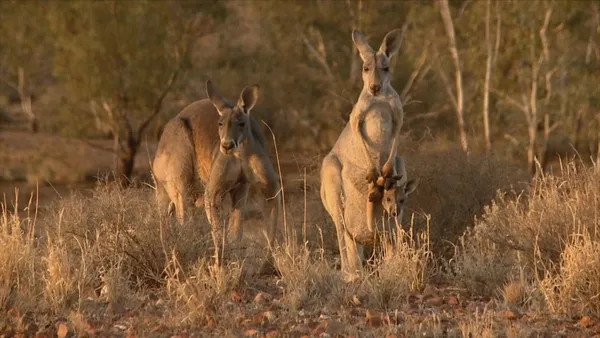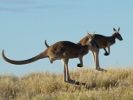Eye For Film >> Movies >> Kangaroo (2017) Film Review
Kangaroo
Reviewed by: Jennie Kermode

There are around 25 million kangaroos in Australia today. Tourists love them. Scientists are intrigued by them. Conservationists mostly want to protect them. The food industry sees them as a resource. Many farmers see them as vermin. Some aboriginal people consider them sacred.
Of all these groups, the aborigines are the only ones whose voices are missing in this film, but in a way it seems to be all about their story. Underlying these competing perspectives is the question of who Australia belongs to. Is 25 million kangaroos too many, or is the problem that humans have taken, and tried to fence off, all the good land? Why is a state of affairs that existed for thousands of years before European settlers arrived suddenly a problem? This unease, lurking at the edges of the narrative, gives this documentary a depth that contextualises the present day scenarios it explores.

It isn't difficult to explain the positive appeal of kangaroos. Footage of them hopping in groups across broad desert landscapes speaks to the sense of romance still attached to the continent. The facts that they're bipeds who nurture their children and live in mutually supportive groups makes it easy to identify with them, and to anthropomorphise them. Many of their gestures resonate with us. Yet the film takes its time to explain the reasons why they're unpopular. We see them carelessly crossing roads (they cause around 17,500 car accidents a year), trampling crops and innocently helping themselves to food which humans consider themselves the owners of. We get a sense of how easily they can seem to overwhelm an area and how frustrating that must be for those struggling to make a living from the land.
This balance, and the detail surrounding it, makes the film easily accessible to people new to the subject and gives it a natural sense of authority. It's skilfully maintained given the naturally moving contributions of people trying to create nature reserves and protect the kangaroos. A sense of agenda develops only in the latter third, when we see the horrors of the hunt - animals shot at randomly in defiance of regulations, joeys ripped from their mothers' pouches having their brains bashed out or simply being left to die - and then a subtler horror: trucks collecting them for the marketplace spending up to two weeks on the road in the Antipodean heat, flies collecting around their prey. Most kangaroo meat goes to the pet industry but, whilst human consumption of it is stigmatised within the country, the better parts are sold to supermarkets in places like Russia, China and the UK. Tests of this meat for salmonella reveal worrying results. We follow activists' struggle to expose the industry, with more success abroad than at home.
There's a lot of interesting material here, and directors Kate McIntyre Clere and Michael McIntyre also keep the film visually interesting, moving between indoor and outdoor locations, talking heads and action. It's not all great red deserts - we see kangaroos in suburban settings, reminding us of how closely they brush up against human life day to day. There's more here for international audiences than for Australians themselves - that tourist appeal again - but either way, this is a solid production which takes on a big subject and acquits itself well.
Reviewed on: 10 Jan 2018


















